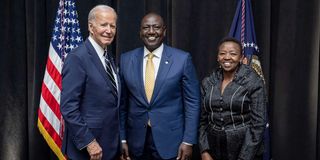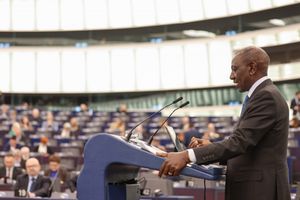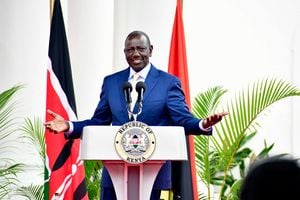
President Joe Biden, President William Ruto and First Lady Rachel Ruto at a past meeting.
It is only a few days left before President William Ruto’s State visit to the United States commencing May 23.
The Kenyan delegation must be putting the final touches to its strategy for the big signature event.
The visit was announced by the White House in February in what was billed as marking the 60th anniversary of US-Kenya diplomatic relations.
The visit is primed with symbolic significance.
There have been several working and private visits by Kenyan leaders to the US. President Ruto’s will, however, be only the third State visit since independence.
Previous State visits have been by President Daniel arap Moi in 1980 and President Mwai Kibaki in 2003.
President Ruto’s visit is seen as emblematic given that the last State visit by an African leader was 15 years ago when President George Bush hosted Ghana’s John Kufour.
Moreover, President Ruto will only be the sixth head of State on a State visit during the Joe Biden administration. He will join a privileged list of head of State visits from the great or middle powers of South Korea, France, India, Australia, and Japan. Thus, the visit establishes Kenya among nations considered close allies of the US.
Further symbolism can be seen in the fact that the Kenyan President will be representing Africa, albeit unofficially.
During the US-Africa Leaders Summit in 2022, President Biden promised to visit the continent in 2023.
This did not materialise and is unlikely to happen given the tense campaign season in the US. Dr Ruto’s visit is being read as a reverse appeasement of Biden’s no-show on the continent.
Also Read: How Ruto is ‘eating big things’
Interestingly, the last visit by a US President to the continent was that of Barack Obama to Kenya and Ethiopia in 2015. President Ruto’s visit can thus be interpreted as the affirmation of Kenya Washington’s close ally in Africa.
Analyses thus far have concentrated on the meetings between the presidents, Joe Biden and William Ruto. But the State visit for the first ladies too: Jill Biden and Rachel Ruto.
Jill champions causes related to military veterans including support for health, education, and spousal support. Rachel promotes child educational enrolment and universal health. Education and health are likely areas of discussion by the spouses during the visit.
Beyond the symbolic dimensions of the visit, presidents Ruto and Biden – their delegations in tow – will be tackling some tough issues.
President Ruto will arrive in Washington DC leaving behind a country restless on the economic front. The economy is saddled by high public debt which has constrained the administration to launch a blistering set of taxes.
The result has been a rising cost of living for an increasing number of Kenyans. Pre-visit indications are that trade and investments will be top on the agenda.
The trade and investment dimensions of the visit are credited in part to the US Ambassador to Kenya Meg Whitman.
A former chief executive officer of tech giants, Hewlett-Packard and eBay, Whitman has been a vocal champion for greater investment by US businesses in Kenya.
It would be a big win if President Ruto returned to Nairobi with major trade and investment deals. It is expected that he will prioritise capital infusion into the squeezed economy.
The Biden administration will be exploring the possibility of Kenya as its continental diplomacy entry point.
The US launched a policy towards Africa in August 2022. Commentators contend that the strategy has not lived up to expectations ostensibly infused with a partnership of equals.
Instead, relations with former allies such as Cyril Ramaphosa of South Africa, Yoweri Museveni of Uganda, and Paul Kagame of Rwanda, have spilled into confrontation. Dr Ruto’s position as the African Union Champion for Institutional Reform – appointed in February – provides a pathway.
The US will likely prioritise peace and security issues. The most significant of this from a Washington viewpoint is the deployment of some 1,000 Kenyan police to a restive Haiti.
Coincidentally, last week, there were reports of the deployment of the first batch of 200 police officers to arrive in Port au Prince on May 23. This will be the same date as the commencement of the visit.
President Ruto and his team are likely to use this “sacrifice” as a major negotiation chip. It is understood Kenya wants a funding arrangement backed by the United Nations.
This is because the deployment is sanctioned by the UN. Kenya will be looking at negotiating for more funds above the $300 million (Sh39 billion) pledged by the US.
Discussions are also likely to factor in Kenya’s position as a peace and security broker in the region.
In early May, for instance, the South Sudan Government and rebels signed a peace deal in Nairobi.
The Democratic Republic of Congo (DRC) is another example where the US will push for Kenya’s involvement as an intermediary between Rwanda’s Paul Kagame and DRC’s Felix Tshisekedi. Kenya also remains pivotal for the US push for peace and security in Sudan, Somalia, and the Ethiopia-Somalia tensions.
The long-running issue of anti-terrorism operations may also feature.
Over the last two and half decades, a geopolitical contest between the US and China in Africa has intensified. Beijing will closely watch the visit.
Since it invaded Ukraine in 2022, Russia has also become a major geopolitical factor on the continent. Moscow will analyse the visit to see if its interests are affected.
Throw in the Israeli-Palestine conflict and you have a mix of balance of power issues that will likely make it to the agenda.
The US is a key backer of Israel, and Dr Ruto is seen as one of the few Israeli allies in Africa.
The Biden administration will be looking to bolster Kenya as a key African ally in its battle for hearts and minds with China and Russia.
This will be a difficult proposition for Kenya particularly in its relations with China. Beijing has a massive set of assets in the country and Kenya owes China billions of shillings in loans.
This state of play circles back to the opportunity presented to Kenya: use the US interests as a bargaining gambit to draw in new investments.
Dr Wekesa heads the African Centre for the Study of the US at the University of the Witwatersrand and is a visiting professor at the University of Southern California, and Howard University.












